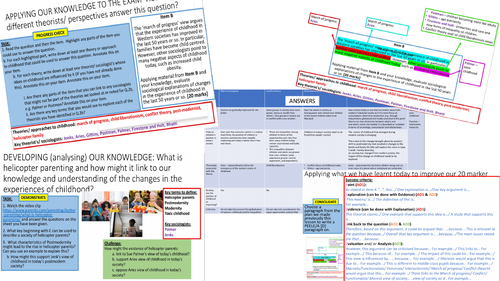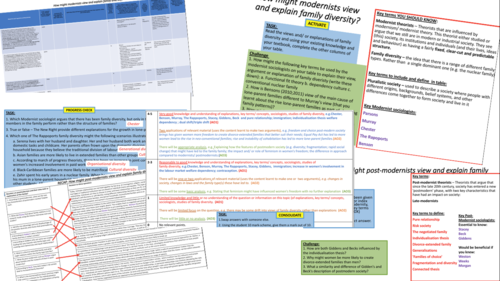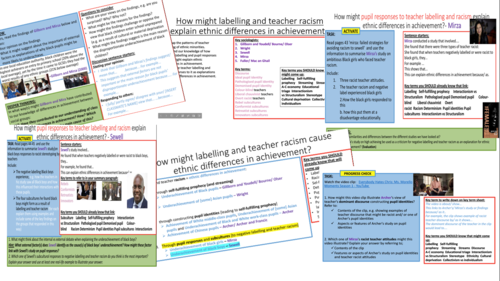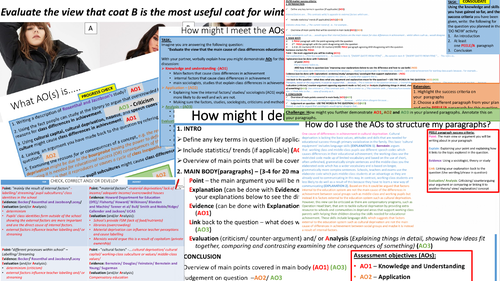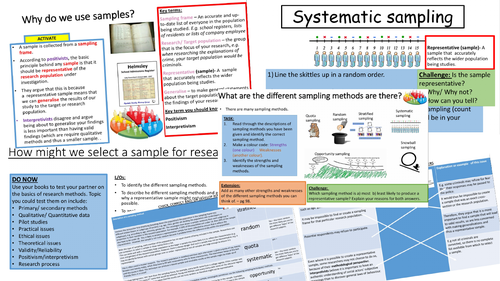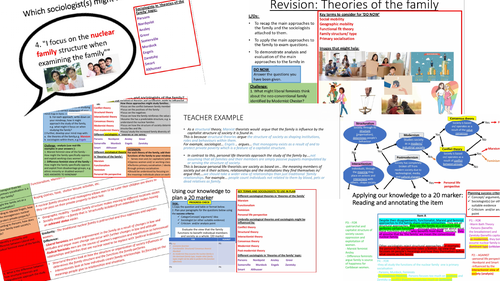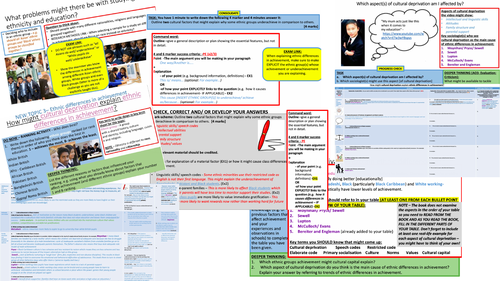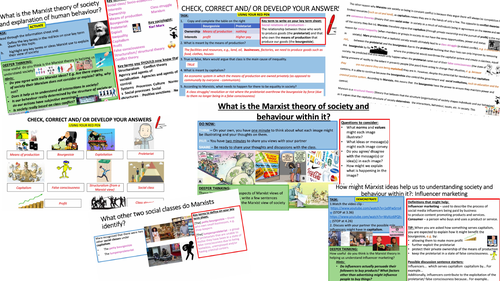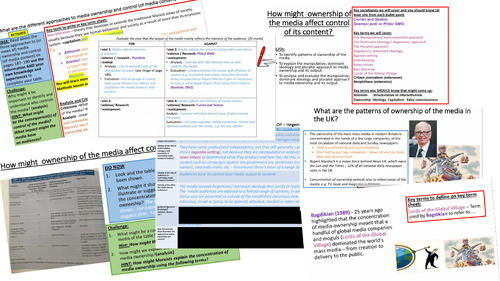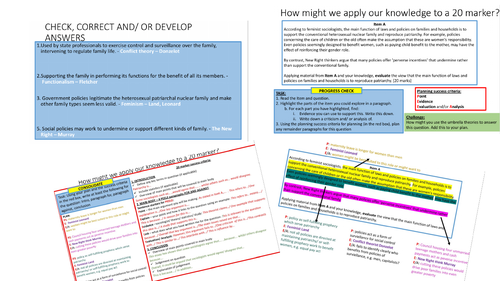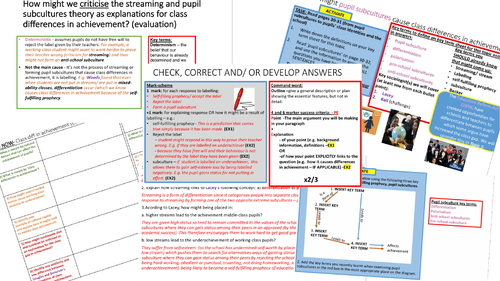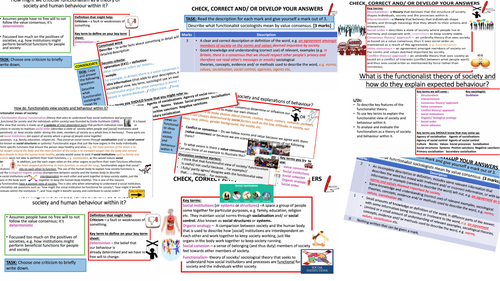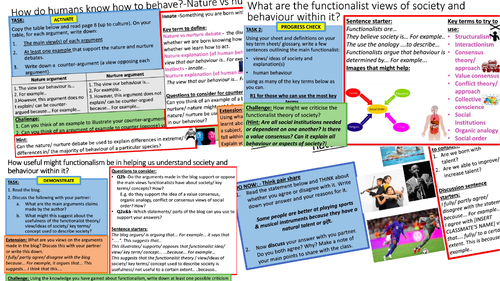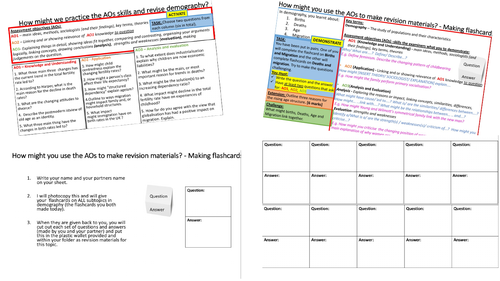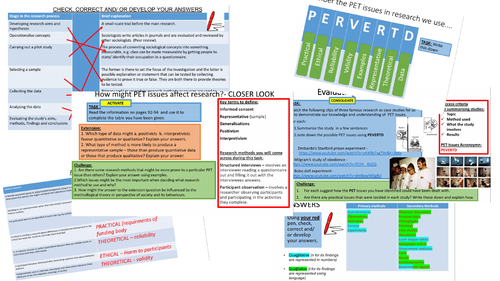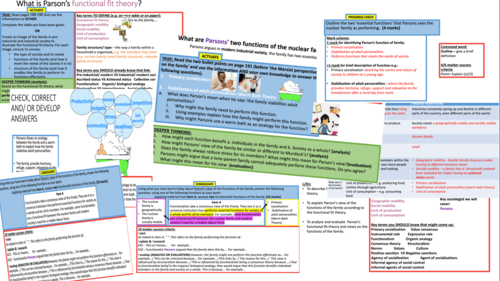
111Uploads
12k+Views
3k+Downloads
All resources

AQA A-level Sociology: Families Topic 2 ‘Childhood’ Revision lesson
Detailed and differentiated (up and down) student led lesson that supports students in recapping the main theories, views and explanations of the position of childhood; examines how march of progress, conflict, child liberationists and postmodernist theories’ view society and how this might influence their approach or view of childhood and its changes over time. Also highlights the key sociologists (Katz, Postman, Aries, Palmer, Jenks, Gittens) in this topic.
The lesson then requires students to apply this knowledge to plan (using a success criteria) a 20 marker and write at least one paragraph for it.
RESOURCES CAN BE FOUND AT THE END OF THE PPT.
MODEL PLAN AND ANSWERS FOR MAIN ACTIVITY CAN BE FOUND ON NEXT SLIDE AFTER ACTIVITY SLIDE

AQA A-level Sociology: Families Topic 6 ‘Family diversity’ Revision lesson
Detailed and differentiated (up and down) student led lesson that aims to recap and consolidate student’s knowledge and understanding of:
key sociologists (Parsons, Murray, Chester and Benson, Stacey, Beck, Giddens and more)
key terms (Rapoports’ different types of diversity, neo-conventional Pure relationship, Risk society, negotiated family, individualisation thesis, Divorce-extended family, 'Families of choice’, Fragmentation and diversity, Connected thesis and more) in the family diversity topic of the family unit.
the main difference in modernist and postmodernist views of: society, the family AND explanations of family diversity.
INCLUDES STUDENT FRIENDLY MARK-SCHEME FOR 10 MARKER ON THIS TOPIC
RESOURCES CAN BE FOUND AT THE END OF THE PPT.
ANSWERS FOR MOST ACTIVITIES (Recap and planning activity) INCLUDED AND CAN BE FOUND ON NEXT SLIDE AFTER ACTIVITY SLIDE
INCLUDES ORACY ACTIVITY

AQA A-level Sociology: Education Topic 3 Ethnic differences - Negative labelling and teacher racism
Detailed and differentiated (up and down) student led lesson that explores the following so students are able to understand and explain how negative labelling and teacher racism might cause ethnic differences in achievement:
Ideal pupil identity , Pathologised pupil identity, Demonised pupil identity, Colour-blind teachers, Liberal chauvinist teachers, Overt racist teachers, Rebels subcultures, Conformist subcultures, Retreatist subcultures, Innovators subcultures
Differentiates between Gillborn and Youdell (or Bourne or Olser), Sewell, Mirza’s view of how teachers might be racist and how this might affect achievement for different groups.
Lesson makes links to the following terms that students should have covered before completing this lesson: Labelling, Self-fulfilling prophecy, Streaming, Streams A-C economy, Educational triage, Interactionism vs Structuralism, Stereotype, Ethnicity Cultural deprivation Collectivism vs individualism.
**NOTE – Students will need to have basic to reasonable knowledge of labelling and the self-fulfilling prophecy. **
Uses and refers to ’ AQA A Level Sociology Book One Including AS Level: Book one 3rd Revised edition by Rob Webb, Hal Westergaard, Keith Trobe, Annie Townend ’ textbook
RESOURCES CAN BE FOUND AT THE END OF THE PPT.

WRITING FRAME - AQA A-level Sociology: Families – Topic 5 Changing patterns (divorce) 20 marker
Detailed writing frame that scaffolds (from introduction to conclusion) a full answer for a 20 marker on divorce (family -topic 5 changing family patterns). Models how to use the item to select points or arguments to answer the question.
*** Based on AQA specification**
Supports students with planning the 20 marker - using planning success criteria.
Outlines the success criteria and provides sentence starters for the full essay (intro, main body and conclusion). Success criteria used for paragraphs in main body of essay is PEELE/A
Outlines the key terms, sociologists, theories that can be used when answering the question.
Supports students who need support and guidance with writing essays whilst providing students who are already good at writing essays opportunities to further improve their essay skills.
Bundle

PREPARING FOR THE EXAM - Family Revision and Essay Writing Bundle
Bundle includes:
Family PLC - EDITABLE - Personal Learning Checklist for the Families and Households unit in the the AQA A-level Sociology syllabus. PLC includes topic and page numbers from the Westergaard and Townsend book one for content students my find hard to locate.
Revision lessons that recaps content and/ or focusses on developing exam techniques for family topics 1-7:
-Topic 1 - Couples - also focusses on exam techniques - AO1, AO2 & AO3
-Topic 2 - Childhood
-Topic 3 - Theories of the family - focusses on AO1 & AO3
-Topic 4 - Demography - briefly focusses on all AOs but mainly AO2 for 10 markers
-Topic 5 - Changing Family patterns - focusses on AO2
-Topic 6 - Family diversity
-Topic 7 -Families and Social policy - focusses on planning essays using the item.
Five writing frames for 20 markers on family topics 2-6:
Detailed writing frame that scaffolds (from introduction to conclusion) a full answer for a 20 marker on:
-Topic 2 - Childhood - evaluate explanations of childhod
-Topic 3 - Theories of the family - whether the family is beneficial
-Topic 4 - Demography - position of the old
-Topic 5 - Changing family patterns -divorce
-Topic 6 - Family diversity - whether individual choice in personal relationships has made family life less important
Writing frames:
Supports students with planning the 20 marker (using the item) - using planning success criteria.
Outlines the success criteria and provides sentence starters for the full essay (intro, main body and conclusion). Success criteria used for paragraphs in main body of essay is PEELE/A**
-Outlines the key terms, sociologists, theories that can be used when answering the question.**
-Supports students who need support and guidance with writing essays whilst providing students who are already good at writing essays opportunities to further improve their essay skills. **

AQA GCSE Sociology Education - The different stages of education and types of schools
Detailed student led lesson on the different stages of education, the different types of schools and the state vs independent divide in education (including arguments for and against private schools). Lesson has been planned to stretch and challenge the most able and included scaffolding to support all pupils with meeting the lesson objectives
**Covers the following key term: **
Nursery school and classes, Primary schools, Secondary schools, Sixth form, Higher education, State schools, Academies, Free schools, Special schools, Faith schools, Grammar schools, Independent/ private schools, Specialist schools, National curriculum, Public schools (extension), Local Education Authorities (LEAs) (extension), Admission policy (extension), Ofsted (extension)
Includes a 3 marker with a success criteria and student-friendly mark-scheme.
ANSWERS TO THE MAIN ACTIVITIES INCLUDED
RESOURCES CAN BE FOUND AT THE END OF THE PPT

Sociology Education Class differences in achievement- How to answer 30/ 20 markers?
Detailed and differentiated (up and down), student led lesson that explores:
the main assessement objectives - AO1, AO2, AO3
how to answer 30 markers
allows studeNts to revise class differences in achievement (external and internal factors).
**Can also be used as a revision lesson for topic 2 (class diff in achievement -internal factors) Includes student friendly success criteria for essay **
ANSWERS TO MAIN ACTIVITIES AND MODEL ANSWER INCLUDED
Made for AQA A-level but is applicable for AS-Level and can be used for ANY SPEC and is still paplicable for GCSE essays

SOCIOLOGY Research methods - Sampling methods
Detailed and differentiated student-led lesson that explores sampling methods, sampling frame, representative (sample), generalising (findings) and the relationship between these and positivism vss interpretivism and theoretical issues. LESSON COMES WITH ANSWERS
Catered for AQA A-level Sociology but can be used for ANY SPEC and GCSE without being edited.
Comes with key term sheet for the lesson.

AQA A-level Sociology: Theories of the Family Revision lesson -How to further develop exam answers?
Detailed and differentiated (up and down), student led lesson that:
recaps the key sociologists students learn in this topic and what they say about the function(S) of the family.
recaps the main umbrella theories that students learn in year 12 (structuralism vs interactionism, modernism vs postmodernism and conflict vs consensus theories), how they view society and how this influences functionalist, marxist, feminist and personal life perspective approaches to the family.
how the knowledge above can be applied to exam questions to demonstrate both analysis and evaluation (AO3), e.g. by highlight the similarities and differences between the different theories of family or using knowledge of the umbrella theories to evaluate theories of the family.
supports students with planning a 20 marker on theories of the family using the item.
**RESOURCES CAN BE FOUND AT THE END OF THE PPT.
***
**ANSWERS FOR MOST OF THE ACTIVITIES CAN BE FOUND ON NEXT SLIDE AFTER ACTIVITY SLIDE
**
INCLUDES ORACY ACTIVITY

AQA A-level Sociology: Education Topic 3 Ethnic differences - Cultural deprivation
Detailed and differentiated (up and down) student led lesson that introduces students to ethnic differences in achievement and explores how different aspects of cultural deprivation (language, attitudes and values, and parental structure) might cause ethnic differences in achievement. To do this, the lesson explores the following key terms: ethnic group, ethnic differences in achievement, cultural deprivation, compensatory education and makes reference to other key terms students should have previously learnt (restricted code, working-class subculture, meritocracy, internal vs external factors, cultural vs material factors)
Uses and refers to ’ AQA A Level Sociology Book One Including AS Level: Book one 3rd Revised edition by Rob Webb, Hal Westergaard, Keith Trobe, Annie Townend ’ textbook
RESOURCES CAN BE FOUND AT THE END OF THE PPT.
ANSWERS FOR MAIN ACTIVITY CAN BE FOUND ON NEXT SLIDE AFTER ACTIVITY SLIDE
*STUDENT FRIENDLY MARK-SCHEME FOR 4 MARKER INCLUDED

GCSE Sociology – Introduction to Marxism
explores capitalism, profit, social class, ownership, interests, structuralism, conflict theories, exploitation, false consciousness and social relations of production as a way to introduce students to the main Marxist views and ideas.
Includes answers for main activities
Resources can be found at the end of the PPT.
Made to meet the AQA spec but can be used (and edited if needed) for other exam boards

AQA A-level Sociology: Media Topic 1 - Ownership and control of output
Detailed and differentiated (up and down), student led lesson that allows students to examine patterns of media ownership and the three main approaches (manipulative, hegemonic and pluralist) to media ownership and control of media output. Also introduces studets to the difference between Marxism and Neo-Marxism and links to structural vs humanistic marxism and structural determinsm. Examines the following concepts to do this: Ideology, Hegemony, Agenda-setting, Gate-keeping, News values, Marxism Neo-Marxism, Lords of the Global Village.
ANSWERS TO MAIN ACTIVITIES INCLUDED**
RESOURCES FOR LESSON CAN BE FOUND AT THE END OF PTT
Made for AQA A-level but can be easily used for other specs (just need a different source of information/ textbook)
**REQUIRES textbook - 'SOCIOLOGY For AQA Volume 2 by Browne, Blundell & Law **

AQA A-level Sociology: Families Topic 7 ‘Families and Social policy’ Revision lesson
Detailed and differentiated (up and down) student led lesson that:
briefly recaps the main theories (Feminism, The New Right, Conflict theory, Functionalism) and theorists (Donzelot,Murray, Fletcher, Land & Leonard) and their views on the function of social policies and the relationship between families and social policies and.
models and supports students in using this knowledge to plan (using a planning success criteria) and answer (using a paragraph success criteria) a 20 marker USING THE ITEM.
RESOURCES CAN BE FOUND AT THE END OF THE PPT.
**ANSWERS FOR MAIN ACTIVITIES CAN BE FOUND ON NEXT SLIDE AFTER ACTIVITY SLIDE
**

AQA A-level Sociology: Education Class differences in achievement - Streaming and pupil subcultures
Detailed and differentiated (up and down), student led lesson that explores labelling, streaming, differentiation, polarisation, anti-school subcultures, pro-school subcultures, pupil subculture, A-C ecnonomy, educational triage to enable students to understand the role of streaming and pupil subcultures in causing class differences in achievement/ working-class underachievement/ middle-class achievement. Also covers and supports students in answering 4/6 markers using a success criteria and student-friendly mark-schemes.
ANSWERS TO MAIN ACTIVITIES AND EXAM QUESTIONS ARE INCLUDED
**COMES WITH FREE A-LEVEL HELP SHEET AND KEY TERM SHEET FOR TOPIC 1 & 2
**
**Made for AQA A-level but can be easily used for other specs (just need a different source of information/ textbook) differentiated down for GCSE) lesson **
Uses and refers to ’ AQA A Level Sociology Book One Including AS Level: Book one 3rd Revised edition by Rob Webb, Hal Westergaard, Keith Trobe, Annie Townend ’ textbook

GCSE Sociology – Introduction to functionalism
Explores value consensus, social order, biological/ organic analogy, structuralism, consensus theories and social cohesion as way of introducing students to the key main functionalist views and ideas.
3 marker with a success criteria and student friendly mark-scheme
Includes answers for main activities
Resources can be found at the end of the PPT.
Made to meet the AQA spec but can be used (and edited if needed) for other specs

Introduction to functionalism
Detailed and differentiated student-led lesson that explores value consensus, social order, biological/ organic analogy, structuralism, consensus theories as a way to introduce students to the main functionalist views and ideas. Can be used for ANY SPEC. Catered towards A-level students but can easily be simplified and/ or for younger students. Comes with key term sheet for the lesson.

AQA A-level Sociology: Families Topic 4 ‘Demography’ Revision lesson
Detailed and differentiated (up and down), student led lesson created to help students recap key ideas examined in the demography topic of the family unit, make revision materials based on this content and be able to apply this knowledge to exam questions, particularly 10 markers that makes links between topics - This lesson is very helpful for developing the skills students need for to answer ‘Outline and explain’ 10 markers which requires students to demonstrate the ability to connect two elements, aspects, subtopics, or topics to answer the question.
Lesson also recaps the assesment objectives (but can be used to introduce students to the assessment objectives) (AOs – AO1, AO2 & AO3). The lesson requires students to answers questions based on each AO and then provides guidance and support for students to use the AOs to make flashcards (with questions and answers).
**RESOURCES CAN BE FOUND AT THE END OF THE PPT.
**

Research methods - Practical, ethical and theoretical issues
Detailed and differentiated student-led lesson that explores practical (time, cost, research opportunity, requirements of funding body & subject matter), ethical (informed consent, confidentiality, harm to participants, vulnerable groups & covert research) and theoretical issues (validity, reliability, representativeness, methodological perspective).
Catered towards A-LEVEL AQA sociology but if main activity can be replaced, the rest can be used for GCSE and ANY SPEC.
Main activity uses pages 92-94 of the AQA A Level Sociology Book One Including AS Level: Book one 3rd Revised edition by Rob Webb, Hal Westergaard, Keith Trobe, Annie Townend
Comes with key term sheet for the lesson.

AQA A-Level Sociology Beliefs in Society PLC (EDITABLE)
Personal Learning Checklist for the Beliefs in Society unit in the AQA A-level Sociology syllabus. PLC includes topic and page numbers from the Westergaard and Townsend book one and two for content students my find hard to locate.

AQA A-level Sociology Families: Theories of the family – Parson’s view of the family
Detailed and differentiated (up and down) student-led lesson that examines, analyses and evaluates functionalist Parsons view of the family (functional fit theory) and his functions (mainly stabilisation of adult personalities – NOT primary socialisation).
Lesson explores the key terms: Functional fit theory, Stabilisation of adult personalities (Warm Bath Theory), Functional fit theory, Geographic mobility, Social mobility, Unit of production and Unit of consumption.
Lesson makes links to general functionalist key terms and family key terms that students might have previously been taught.
Main activity makes reference to AQA A-level Book 1 by Townsend
***** MOST ACTIVITIES INCLUDE ANSWERS****
Starter assesses prior learning on family topics: couples, childhood and Murdock’s functions.
***** WORKSHEETS AT THE END OF THE PPT**

